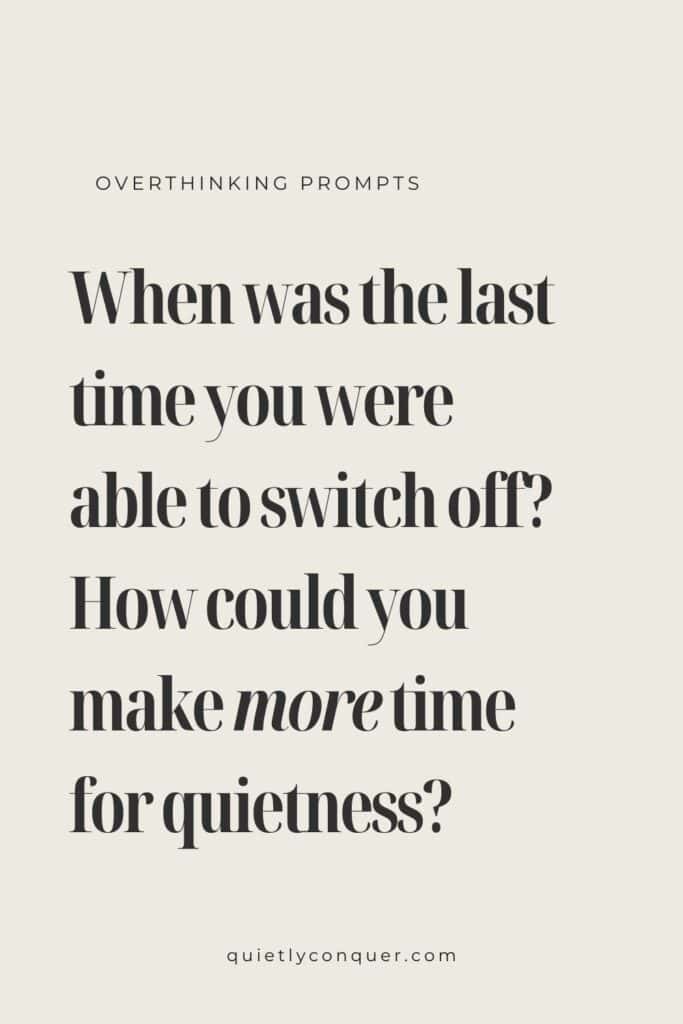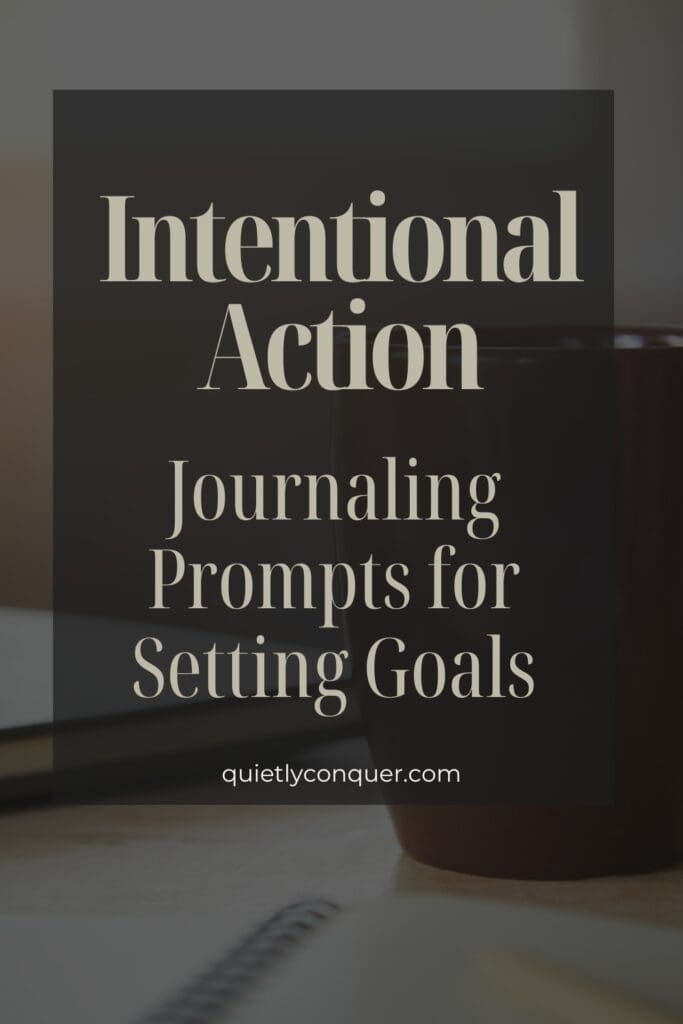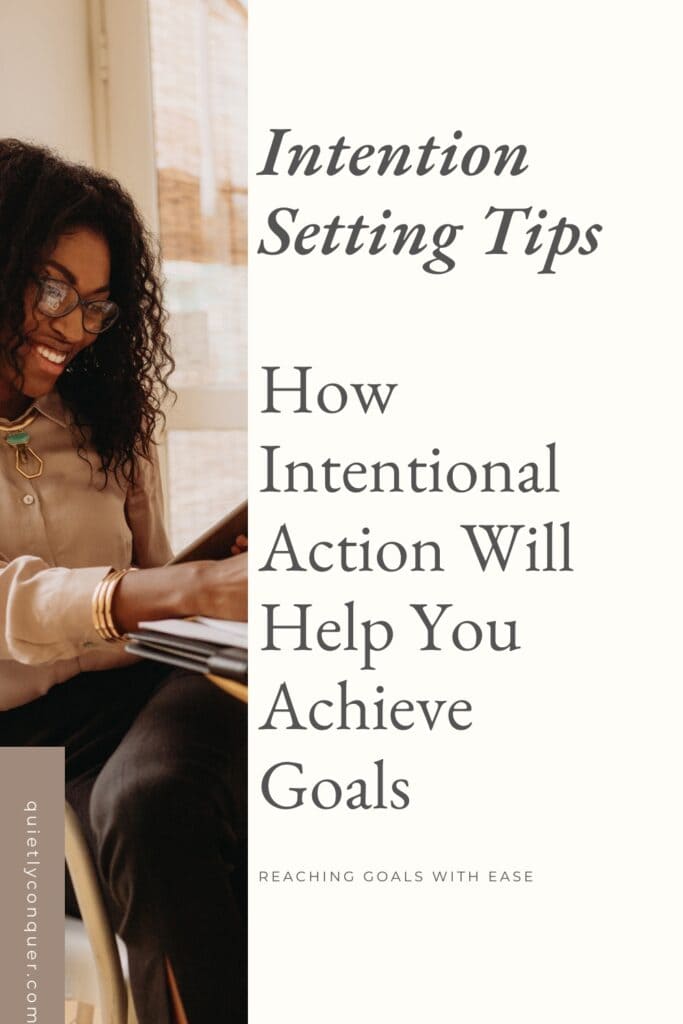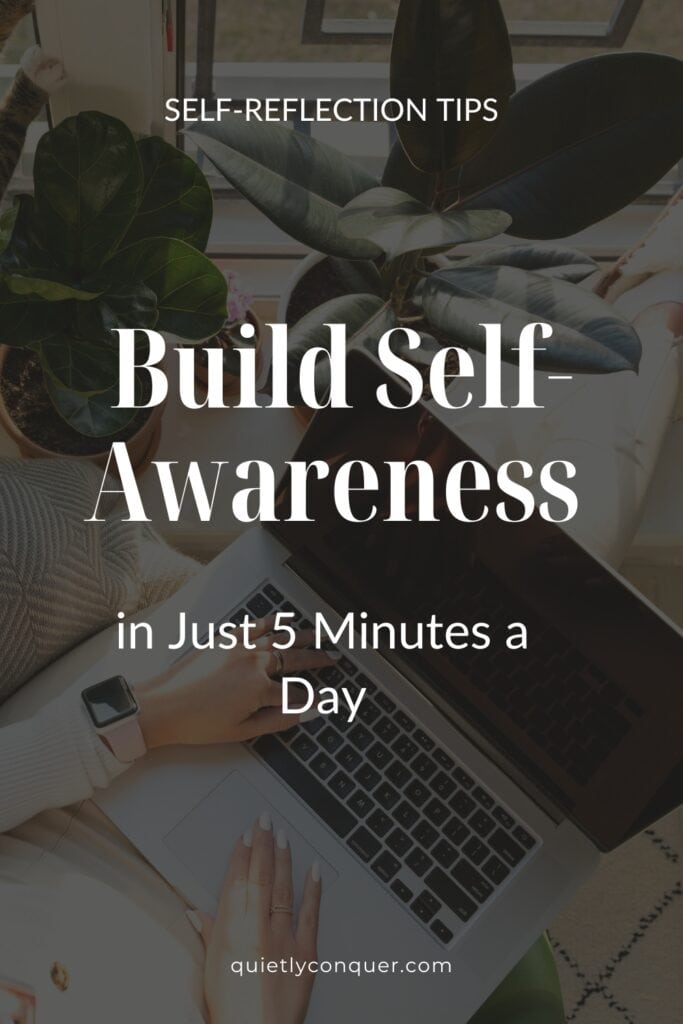50 Journal Prompts for Goal & Intention Setting

Why Intention Setting Matters With Your Weekly Planning.
When you start your week with your goals and intentions in mind, it sets you up for a productive, enjoyable and successful week.
It can be easy to feel overwhelmed if you’re a service provider, or business owner, to know what you need to focus your attention on. For fellow neurodiverse or low energy women, it can get chaotic pretty quickly!
There are many distractions that can derail your personal and professional progress, and if you’re feeling uncertain or unfocused on a Monday morning, it can set the tone for the rest of the week.
Focused journaling is one of the ways that you can avoid those feelings and set the tone for a positive week, and the bonus is, it only takes a few minutes of your time!
Making time for intention setting alongside goal setting each week, will help you focus on a more holistic and balanced approach to the week ahead.
*Affiliate Disclosure: Some links in this post may contain affiliate links. If you purchase something via the link, I may receive a small commission. This doesn't affect the price you pay.
If you have any questions, reach out for a chat [email protected] or check out my other blogs
Table of Contents
Reflect & Review Weekly
Taking time each week to reflect and review will enable you to stay intentional with your plans. Set aside some time on a Friday or Sunday to look back over your week. Notice your progress, challenges, wins, and anything that needs adjusting. This simple habit helps you stay aware of what’s working, so you can tweak things before too much time or energy is spent heading in the wrong direction.
Use the time to acknowledge your wins (big and small), and any progress made. Recognising these not only boosts confidence, but also strengthens the habit of noticing what is going well, which can also help to keep that motivation going.
If you save your planning for a Monday, it can slow you down. It’s easy to slip into “planning mode” rather than starting the week with focused energy. Doing your weekly review and intention setting before the new week begins means you can embrace that “fresh start” energy.
I reflect daily using my Notion planner, then do a full check-in on Friday mornings. This helps me end the week with clarity. On Sundays, I set intentions and prioritise goals for the week ahead. Working this way eases the “Sunday dread” and allows me to head into Monday with calm focus, knowing I already have a plan that supports my energy and goals.
Questions to help you focus on your progress the previous week:
- What were your biggest wins this past week?
- What felt good or what didn’t feel so good and explore why.
- How did you deal with any challenges and what did you learn from them?
- Were there things that you noticed you wanted to do more or less of?
- How focused were you overall and how much progress were you able to make?
- How did you feel across the week?
These questions don’t have to take you too long, especially if you review at the end of each day. But they will help your Sunday planning, giving you clarity and a good starting point, supporting intentional action in the week ahead.
Intention Setting for the Week
Intention setting wasn’t something I used to think about until I learned it from another coach. I’d always been focused on goals – on what I wanted to achieve, but I rarely paused to think about how I wanted to feel or who I wanted to be while working toward them.
It’s easy to stay stuck in “doing mode,” where productivity takes priority and your own needs become an afterthought. That’s why I now always recommend including intention setting as part of your regular planning sessions. It creates space to check in with your energy, values, and the bigger picture behind your goals.
What is the difference between Goals and Intentions?
Goals
Goals are future-focused. They represent where you’re heading. They’re specific, measurable, and often tied to a deadline or outcome. Tutoroot, 2023. Because they’re tangible, they help you feel more focused and purposeful in your work; each step forward brings you closer to a clearly defined result.
Your goals don’t always have to be “sensible.” You can dream big and bold, as long as you break them into smaller, manageable steps. This approach turns the biggest visions into something realistic and achievable.
Intentions
Intentions, on the other hand, are present-focused. They’re less about what you want to achieve and more about why you’re doing it and how you want to feel along the way.
While goals give you direction, intentions shape your experience. For example, your intention might be to feel more rested and balanced. From that, your goal could be to finish work at a set time each day or to prioritise daily breaks and self care.
Intentions guide the energy behind your actions. They help you show up with purpose, even on days when motivation feels low.
Why Intention Setting is as Important as Your Goals
When you focus only on action-based goals, it’s easy to overlook the emotional side of progress. This can lead to feeling pressured, and thinking that you always need to do more.
But when you start by considering how you want to experience your week on a personal and emotional level, you naturally create more aligned plans. You begin to consider what you truly need, not just what needs to get done.
Setting intentions alongside your goals helps you design a more realistic and motivating roadmap for the week ahead. It connects your actions with your why, making it easier to stay focused and encouraged even when motivation dips midweek.
Whenever I sit to reflect on my goals and progress – whether for the month or the week ahead – I always include two simple, but effective questions:
- What are your intentions for the week ahead?
- How do you want to feel this week?
These small reflections can completely shift how you approach the days ahead.
50 Prompts for Goal & Intention Setting
Use some of these prompts to guide your own weekly or monthly reflections:
Gratitude & Reflection:
- List three things you're grateful for. Why do they matter to you?
- Reflect on a recent win. How did it make you feel?
- Describe a time that you felt truly happy. What was different and how could you create this feeling again?
- How do you define what success means to you? (Personally or professionally)
- Describe one positive change that you’ve noticed in yourself lately?.
- Think about someone who inspires you. What is it you admire in them?
- Describe a recent learning experience. How will it impact the way you do things or respond in the future?
- What brings you joy each day? How can you bring more of this into your everyday life?
- Describe a time where you achieved something that you didn’t believe you could.
- Reflect on the past week. What were the highlights, and what made you smile or feel proud?
Goal Focused:
- List three goals for the week ahead. What action will you take to achieve them?
- Identify a long-term goal you have but you’ve been putting off. How can you break it down into smaller, actionable steps?
- What part of your working practices would you like to improve? How can you begin this?
- Imagine what your ideal week looks like. What are you doing? How are you feeling?
- How can you prioritise your tasks this week so you’re working efficiently?
- Look at your current schedule. Are there changes you can make for improved time management?
- What skill would you like to learn or develop? Create a plan outline to make this happen.
- What challenges could you face this week? What steps can you take to prepare for them?
- Write a mantra for the week ahead, add it to a post-it note & put it where you can see it each day.
- If time is limited this week, what is the one thing that would make you feel accomplished when you review things on Friday?
Self Belief:
- How would you describe yourself in three words? Next, think about whether these words represent your ideal self.
- What would you change about your life if it was possible? What difference would this make?
- What advice would you give to your future self? Write yourself a letter to be opened in 5 year's time.
- What advice do you think your future self would give you right now? Embody that vision of the future you, and write a letter to you right now.
- Think about your friends or loved ones. How would they describe you, and what would they say are your values and strengths?
- What is your biggest fear? What steps could you take to start facing the fear?
- Describe your perfect day from start to finish. Describe how you would feel, and the things that would contribute to your perfect day.
- How connected are you to your intuition? When you think about the week ahead, what does your intuition tell you about this week?
- How can you be more compassionate towards yourself this week?
- How do you talk to yourself when you’re feeling stressed or overwhelmed? How can you make sure that your inner dialogue is kinder?
Mindfulness & Wellbeing:
- How are you feeling today? What can you do to improve your mood or feeling of confidence?
- How have you been sleeping lately? How could you improve your sleep routine?
- Think about three things that you can do this week to reduce levels of stress.
- Describe the last time you felt anxious or overwhelmed. How did you cope in the moment?
- Reframe your negative beliefs you have about yourself. Add what a friend or loved one would say to you if you shared this belief with them.
- When was the last time you were able to totally switch off? How could you make more time for quietness?
- Take a few moments to practise deep breathing exercises. Write about how it makes you feel.
- How can you nurture your feeling of calm and confidence as you approach difficult tasks or face challenging events?
- Describe something that brings you a feeling of peace? How can you make time for this throughout the week?
- Write down three negative or unhelpful thoughts you hold about yourself or your abilities. Challenge them – Write down evidence to disprove the thought.
Low Energy Week:
- How are your energy levels at the moment? How can you lessen any additional pressures and focus on increasing your energy this week?
- Who can you ask for support this week? (Think personal or professional).
- How can you map your week so that you’re not always working on high-energy tasks?
- What is the bare-minimum that you could achieve this week that will make you feel accomplished?
- Think about your bigger goals, how can you approach them more flexibly this week?
- What time management techniques can you utilise this week while you focus on your energy?
- How can you show yourself grace this week? What would you say to a friend who was feeling like this?
- Describe the things that help to recharge you and improve your energy. How can you make time for them this week?
- Describe the reasons why you chose to work in a more flexible way. Are you honouring these reasons this week? If not, relook at your schedule and make the changes!
- What feelings are coming up for you as you think about taking it easier this week? How can you manage any negative feelings like guilt or shame?
You can also download these weekly goal and intention setting prompts so that you can add them to your own journal. Blank journal pages included!
Tools, Resources & Support
Each post I add my favourite tools and resources, so here are some more just for you!
Thought-Shifting Mini Journal – CBT-Based Thought Shifting Activities + mini journal with prompts
Cognitive Distortions Worksheet – Support emotional clarity and build self-awareness with this printable CBT thought distortions worksheet. It's designed to help you (or your clients) challenge negative thinking patterns using practical cognitive behavioural therapy techniques.
Impact Stationery – Have you ever dreamed of creating your own high-end stationery products? Laura has an amazing course & community designed to help you created printed products that you can market on Amazon, or your own website. It's different to KDP in that they're not print on demand, and the quality of products are incredible.
Etsy – Are you ready to create your own online store? Etsy is a brilliant shopping platform that's used by millions. Setting up your store is simple, and when you sign up with this link we both get 40 free listings!
Pinterest Guide – If you're looking to get into Pinterest, I highly recommend Amy's free guide and Pinterest course. It's up-to-date & she also has a brilliant course for only $67 that's updated frequently. (I have a 50% discount on the course using this link SEO and the code RANK)
Your Growth System – This all-in-one system for service providers / coaches / therapists / VA's etc. is a perfect way to save time & energy. Improve your productivity and beat procrastination by having everything you need to run your business in one place!
Final Thoughts
Too often we focus only on doing without paying attention to our own needs, which can be a big trigger for overwhelm or burnout.
If you struggle with energy issues, or you’re juggling lots of things alongside your work, just remember that progress isn't linear. It’s also not a race, and making time to be present and enjoy the journey towards your goals will help you feel fulfilled and balanced,
Yes you may have deadlines to work towards, and intention setting isn't about forgetting that. It's about making sure that you are also making time to take care of yourself physically and emotionally. When you create more balance, you'll be more likely to maintain momentum without burning out.
You don't need to spend a lot of time journaling, or hours each Sunday planning. A few minutes to gain clarity and think about the week ahead is more than enough to gain more clarity and create an intentional way of working.
I'd love to know how you plan each week and how you can introduce intention setting into your weekly planning.
If this post helped or you enjoyed reading it, please share one of the images below as it really helps my blog – Thank You!



Meet Lynsey

Hey there! I'm Lynsey, a counsellor, coach and mentor for women who want to create change, but are feeling lost, uncertain and exhausted. With over 7 years’ experience of training, running businesses, and over a decade as a tutor and adult trainer, I've learned the value of a gentle and intentional approach to work and life that energises you without draining all of your energy.
I've lived with ME/CFS since 2011, and since then re-trained as a counsellor, and achieved a distinction for my Masters in Counselling and Psychotherapy Practice; all while running 4 businesses!
How? Improving your mindset, finding acceptance in yourself, and developing a gentle, but solution-focused approach to achieving goals is key. Knowing that it's not about how fast you move, but finding your own pace and trusting that you can achieve your goals in your own way, one step at a time.
If you'd like to know more about working with me, you can email [email protected] or find me on socials (links in the menu)
Have you seen my online store Quietly Conquer – Find DFY templates, downloads and more!






